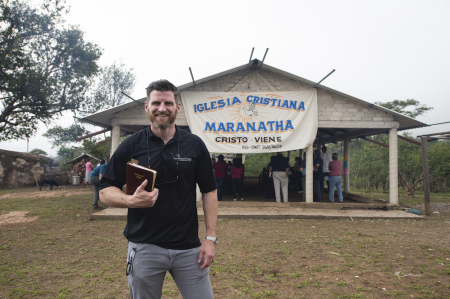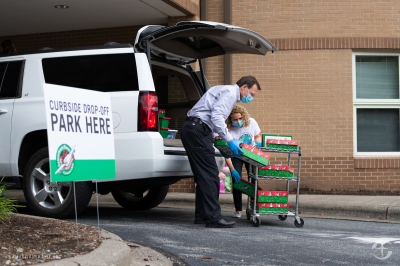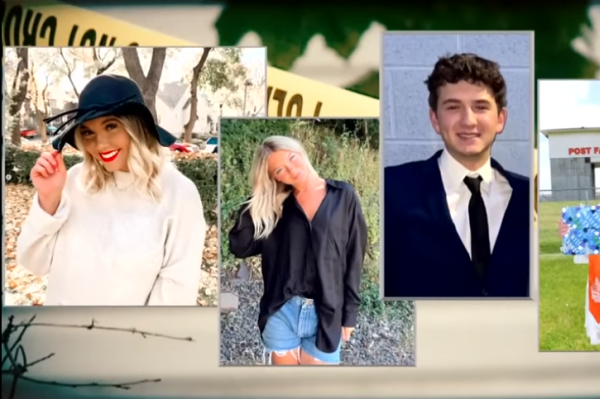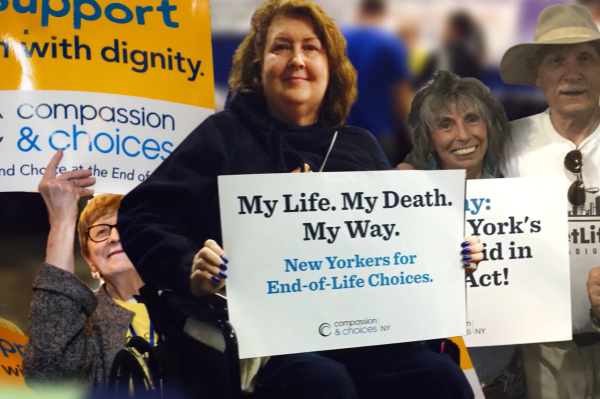Edward Graham credits brave volunteers for reaching 9M children with the Gospel despite COVID-19

Edward Graham, the grandson of the late evangelist Billy Graham, who serves as assistant to the vice president of international relations at Samaritan's Purse, testified to the bravery of Operation Christmas Child volunteers who helped share the Gospel with 9 million children as the world shut down during the COVID-19 pandemic.
Operation Christmas Child, a project of Samaritan’s Purse, has continued the mission of spreading the Gospel despite church closures during the lockdowns.
Although government restrictions or fear prevented many from ministering as they usually would, more than 270,000 volunteers in the U.S. and nearly 570,000 volunteers worldwide stepped up to send millions of gift-filled shoeboxes to children last year.
Churches found creative ways to pack and collect boxes while staying socially distanced. The shoe-sized gift boxes also contained booklets with the Gospel message and were sent to over 160 nations, including 50 hard-to-reach areas.
"I look at our volunteers and, even in the face of a pandemic, they weren't afraid," Graham told The Christian Post in an interview that can be watched below.
Graham is no stranger to evangelism as his late grandfather and father, Franklin Graham, and other members of his family have traveled the world to share the Word of God.
This month, the evangelist is traveling to Zambia, where he works with Samaritan's Purse to see the Gospel's impact in that nation.
The U.S. Army veteran has also traveled around the world with Operation Christmas Child. He's seen firsthand how the boxes are used as an effective evangelism tool — from the mountains of Mexico to his recent trip to Azerbaijan, where he had to quarantine after contracting COVID-19.
The organization collected 9.1 million shoeboxes last year, with 7.8 million coming from people in the U.S.
Operation Christmas Child also offers a 12-lesson discipleship program called "The Greatest Journey," which takes children further into discovering what it means to follow Jesus and how to share it with their family.
"We haven't lost, fortunately, a single staff member to this virus," Graham testified. "Now, we've lost loved ones and friends; we've lost ministry partners. This virus is very real."
"These kids are going to be dealing with the scar tissue of this virus for years to come," he said. "They don't understand why the world around them is shut down. They may be living in fear. This is the opportunity to share the hope of the Gospel of Jesus Christ."
The following is an edited transcript of The Christian Post's interview with Graham, where he details the miraculous work of God who used volunteers to help reach millions of children worldwide.
CP: Despite the pandemic, 9 million children around the world still received gifts and the Gospel. How was it possible to have all the volunteers come together to make this happen during COVID-19?
Graham: Well, in reality, it's not possible; it shouldn't have been possible. But with God, all things are, and so He gets the glory and the credit, clearly. It was an unbelievably challenging year for the team. We knew that going in because there's so much uncertainty, each state is different.
Operation Christmas Child, though it does have employees, this is all donor and volunteer-driven — this part of the ministry at Samaritan's Purse. It takes the local church here in the U.S. to organize, to do packing parties, volunteers that come alongside to collect the shoeboxes, to deliver the shoeboxes to processing centers. That's not done by paid staff, and we have some of the best volunteers. But then you transition, and the boxes go forward and they go to the countries that there to be delivered in. And there are volunteers on that side, even more [people] that are trained and equipped in Gospel presentations and how to do that. They go out there and share the Gospel with these children.
So each state has different rules. Each country has different rules. Each country has issues even without a pandemic when it comes to importation. So we knew this was going to be an unbelievable challenging year. But God, just like He's brought us some of the most incredibly talented staff — I come from a special operations background in the military, and I was surrounded by talent there — I'm just so impressed with the team that God's assembled here in Operation Christmas Child to make this possible.
I look at our volunteers, and even in the face of a pandemic, they weren't afraid. Yes, we had to make adjustments, yes, based off each state's regulations. But we were processing shoe boxes ... we processed shoe boxes in California, Colorado, Texas, Illinois, in Baltimore, Maryland, two places here in North Carolina, and down in Georgia.
We knew some churches weren't meeting. So that was another thing. The challenges of churches not meeting, what was the season going to look like? The year previous, we had done just shy of about 12 million shoeboxes, I believe, around the world. So we still had a broad goal going in. But what was so incredible is that almost 9 million shoeboxes [were] collected during this pandemic. And what better way to love on children that are scared?
They've been shut up. They don't know what's going on around the world, around them. But God knows each and every child that needs to hear the Gospel. Those 9 million shoeboxes that have been collected, there was a faithful participant that God has a plan for with that box. He knows the kid who gets to hear the Gospel alongside of it. So a challenging year, but boy, what an exciting time to be part of the ministry.

CP: Churches sometimes struggle with getting people to volunteer. What is it about this ministry, especially during a pandemic where many are scared, that compels people to still be eager to serve in this capacity?
Graham: I've asked myself that over the years. I can remember, as a kid, when Operation Christmas Child started, and it was small. I remember the origins of it. It was kind of by accident that my dad agreed to do it, and the Lord took it from there.
Around the idea of Christmas and a gift, ... we exchanged gifts here in the West, and it makes us feel good and we'd like to smile and give someone that we love something special. But it's to give to those children that we don't know or that don't have a name, or we don't have a face to give them the ultimate gift. And that is the Gospel, to share the Gospel in their language. So volunteers, I think, because it's Christmas and that idea, they volunteer.
It's year-round, overseas, the shoeboxes are going around all different times of the year. But I think people come out because they know this is a ministry that's about the Gospel and it's unashamed. That a little kid somewhere out there is going to hear [the Gospel] as clear as day in their own language. So the churches and the volunteers believe in that. Especially the mission-minded churches that believe in going out and to evangelize others to fulfill the Great Commission.
I think churches know that. They don't all know the story behind OCC and truly what it does and how many kids it's reaching. Not every church knows that, but I think the volunteers, a good portion of them, do. The ones that don't, they come in, they hear it, they [get] energized for more, and they want to be more a part of it. That's when we see them take leadership positions.
We've got volunteers that I know they're working full-time hours, and they're not getting paid for it; that's a God thing. That's [God] placing that burden on someone's heart, and we got some of the most special people.
The other thing I like about this ministry is people getting uncomfortable. If you're sitting at home and you're comfortable, I think you're missing the part of ministry. Nothing about our faith, really, I think should make us comfortable. I look at the story of the disciples sitting in the boat. Peter was the only one that got out and walked on water. I learned that if you want to be part of a miracle, you got to be uncomfortable.
I think many of our volunteers are serving in areas they normally wouldn't do. They're prayer coordinators. They're leading prayer teams. They're leading church leadership teams out there to gather and equip churches with information. That might be something they're not normally doing, but they try it or someone encourages them to do it and they fall in love with it. I think that's good portions of the ministry.
Overseas, [it's] these church partners and pastors or volunteers who are teaching these kids that Gospel. I see people dressed up like clowns when I go over there and doing a clown presentation. They probably never would envision themselves doing that, but they volunteer because they know it is sharing the Gospel and they're seeing lives changed. They're seeing communities changed and smaller — like we did in a small mountain village in the middle of nowhere, with an unreached people group. And now their sister village is planting a church. It's all because volunteers are willing to get uncomfortable.
CP: Did you guys have any scares during this pandemic?
Graham: There were challenges and the Lord protected our staff. But we did have a couple of staff members, and one employee in particular here in Charlotte, North Carolina, who got sick. He's from Texas but he got sick and was hospitalized. His wife got it, too, and she recovered fine in the hotel room. But he was hospitalized for months and by no means should have lived. That prayer network that I was talking about, the prayer warriors, you have almost 270,000 volunteers here in the U.S., 570,000 volunteers overseas — that network went out praying. A few weeks ago, we had a meeting with this man at dad's office before he flew back home to Texas; he's going to fully recover. That's a miracle.
Were there other instances? Maybe staff members overseas and stuff getting sick, but we haven't lost, fortunately, a single staff member to this virus. Now, we've lost loved ones and friends; we've lost ministry partners. This virus is very real.
You hear a lot of things on TV and a lot of misinformation on the internet ... I've seen it; I've been in the ICUs. It's a very real virus, and it's taking lives. But that doesn't mean we need to live in fear. It doesn't mean we shy away. That's what I love about all of Samaritan's Purse ministry opportunities when the virus hit.
We were setting up hospitals in Italy. No one else was going to Italy during the height of the pandemic there. We went to New York City during the height of that. We go where the fire is. Operation Christmas Child, it hasn't let off the throttle either, and I couldn't be more proud of the team and those church partners overseas; they're hungry.
These kids are going to be dealing with the scar tissue of this virus for years to come. They don't understand why the world around them is shut down; they may be living in fear. This is the opportunity to share the hope of the Gospel of Jesus Christ. OCC is well placed, ready, it has been, and this year proves that.
Now the shoeboxes have been collected, they're already being delivered to these countries. We have opportunities in closed countries that have denied that we've never had before. God knew this would happen, but He had a plan for it. We just had to be obedient.
CP: There was a quote in an OCC press release that said, "God used this year to strengthen his church and lay a strong foundation for future ministry. Although we are apart, we are more unified than ever." This pandemic might have changed the way ministry is conducted. What do you think that means?
Graham: I saw that quote and I've been thinking. People ask me a lot about my grandfather's ministry and the Billy Graham Evangelistic Association. Many people remember it as filling the stadiums and people hearing the Gospel, and my grandfather doing the invitation and "Just As I am" playing, and people coming down, and unbelievable memories and pictures of seeing that growing up as a child. We may never meet like that again. I don't know. I hope we do. I'm ready for it. My father does those types of events.
We are seeing things open back up. But I see how ministry is conducted and how churches operate. We were never meant to be alone. That is the hope that we have in Jesus Christ in that relationship we have. That He died on the cross for our sins that we were not alone through Him. But even as a fellowship of the Church we need to meet, we need to group together; we need and can do it safely.
But it's two different things when the government's telling you that you can't meet, yet the liquor store is open or Walmart's open. I think we have a problem. That's when we need to reevaluate as the Church, to do what we need to make sure we're still worshiping.
What I love about OCC is it's just not a ministry that happens in a country overseas. Part of the ministry happens right here in the states where it's collected, or in some of our partner countries like Canada, the U.K., Germany and Australia. ... We don't want the boxes collected at a store. We don't want them collected at a car dealership. We want them collected at the Church.
Not everyone who packs a shoebox is a believer. This is an opportunity for the Church to reach out to minister to those in their community as they collect them, to be able to share the Gospel there, to pray for them.
Some of our prayer ministries at our drop-off locations, you're able to drop off a prayer card. How can we pray for you? We'll continue to pray for you. You might not think we know who you are, but if you leave a prayer card, you're mentioned by name or by prayer. God knows who you are. That's part of the ministry in itself too. I think churches see that and know that Operation Christmas Child didn't shut down.
Maybe we couldn't send our mission trip this summer. The youth group couldn't go out, and they couldn't go do something on one of the first people reservations or something like that, or they couldn't go overseas and serve in the Pacific Islands like they were planning to. But Operation Christmas Child was going.
Those Gospel opportunities did not shut off. Churches see that and know that though they might not be able to go in person, there's other organizations like Samaritan's Purse and Operation Christmas Child that don't let off the accelerator. This was the time to go. The pandemic happened. It's time to get to work!
CP: What advice would you have for others who want to do humanitarian work but there might be fear, there might be reservations, there might be some kind of intimidation?
Graham: I've met a lot of our volunteers, and our volunteers come in all shapes and sizes. I look over all volunteers that work with Operation Christmas Child, and many of them have physical handicaps and elements where the world may say you can't do that. In their mind, they probably thought at times, 'I can't do that; they won't want me.' That's Satan, that Satan's lie telling you that you're not meant for the Kingdom, or that God's blessed everyone else but you, you're not equipped.
I don't care what your background is or where you were raised. If you're born with a handicap, if an ailment came later, or you just don't think you're spiritually equipped, I will tell you right now, I'm not an evangelist. I'm not my grandfather. I wasn't skilled the same way. I got his big nose and big chin, but God has given me and trusted me with other opportunities to go out there and serve. I had to get uncomfortable to do that.
I loved what I was doing in the military. But I had to leave the military, get out of my comfort zone and come serve here at Samaritan's Purse.
That's my prayer for other people out there in churches that are sitting there, maybe in their pews, 'What can I do? Is there an opportunity for me to serve?' The answer's yes!
You just have to take that step and get out of the boat and take that step on water and take that step of faith. And God will be there with you just as He was with Peter. And sometimes we'll take our eyes off and we'll slip, but He'll pick us up and we'll walk again. You'll be part of a miracle the second time. You just got to keep walking in faith. That's how I look at volunteers. We got all shapes and sizes.
We do a ministry in Alaska for wounded soldiers. Then afterward, many of them participate in disaster relief with us. These are men and women who are missing legs, arms. The world said they couldn't do it. But they're out there driving, they're using chain saws and cutting trees down [with] one hand ... Nothing's holding them back from serving. They just had to go out there and keep pushing.
So that's my hope for people sitting in that pew. Serve first in your local church. That's where I want you serving. And then, if you're feeling a little frisky, why don't you try it once, try Operation Christmas Child or somewhere else in Samaritan's Purse.
CP: Volunteers across the U.S. are now ramping up for the 2021 efforts. What can we expect for this year's Operation Christmas Child?
Graham: Operation Christmas Child, most people think it's just at Christmas, but it's always continually going on. Now we ramp up with collection week. Collection week will come up again, as it always does, this November. But if you have questions about Samaritan's Purse or if you'd like to volunteer to know what collection areas are in your area, or what churches are participating, you can go to Samaritanspurse.org/OCC and there is a wealth of information on there that will guide you through this.
We have a strong goal. We want to collect more shoeboxes this year than we did obviously the previous year coming out of the pandemic. The team has set a pretty high goal for that. I think they're looking somewhere around 12 million.
Coming out of this pandemic, we know these kids have scar tissue, they've been living in fear. We need the church to come alongside and partner with us. Because as I said, each child gets the Gospel presentation.
My favorite part of the ministry, though, is The Greatest Journey, and that is a 12-lesson plan, discipleship program where kids who make decisions for Christ go out and learn how to tell others about Christ. Four million kids go through that. Those are kids who are believers and trust Christ, and they're going out and teaching others, as we saw in Mexico. That church is a result of The Greatest Journey and that church plant, so we know it's working.
For more information about how to volunteer or pack shoebox gifts, visit Operation Christmas Child’s website.
Jeannie Ortega Law is a reporter for The Christian Post. Reach her at: jeannie.law@christianpost.com Follow her on Twitter: @jlawcp Facebook: JeannieOMusic





















